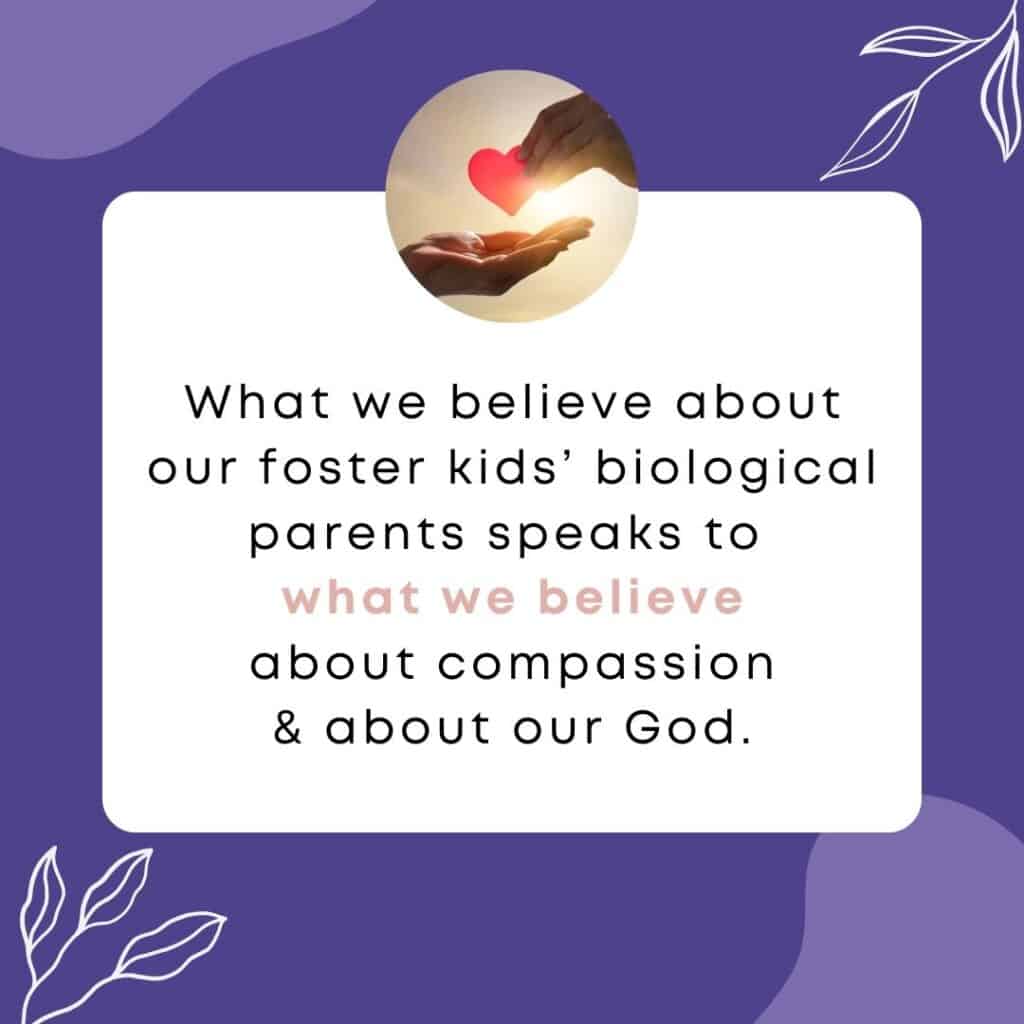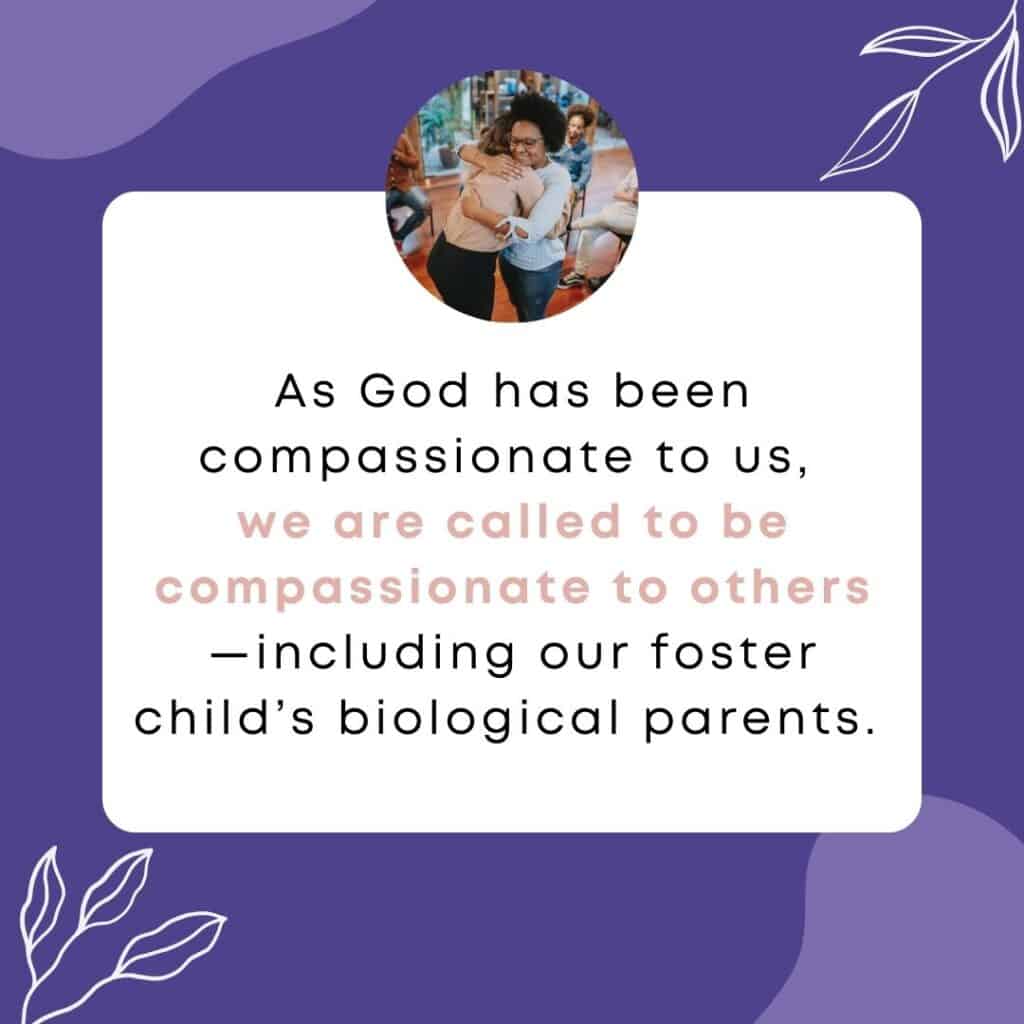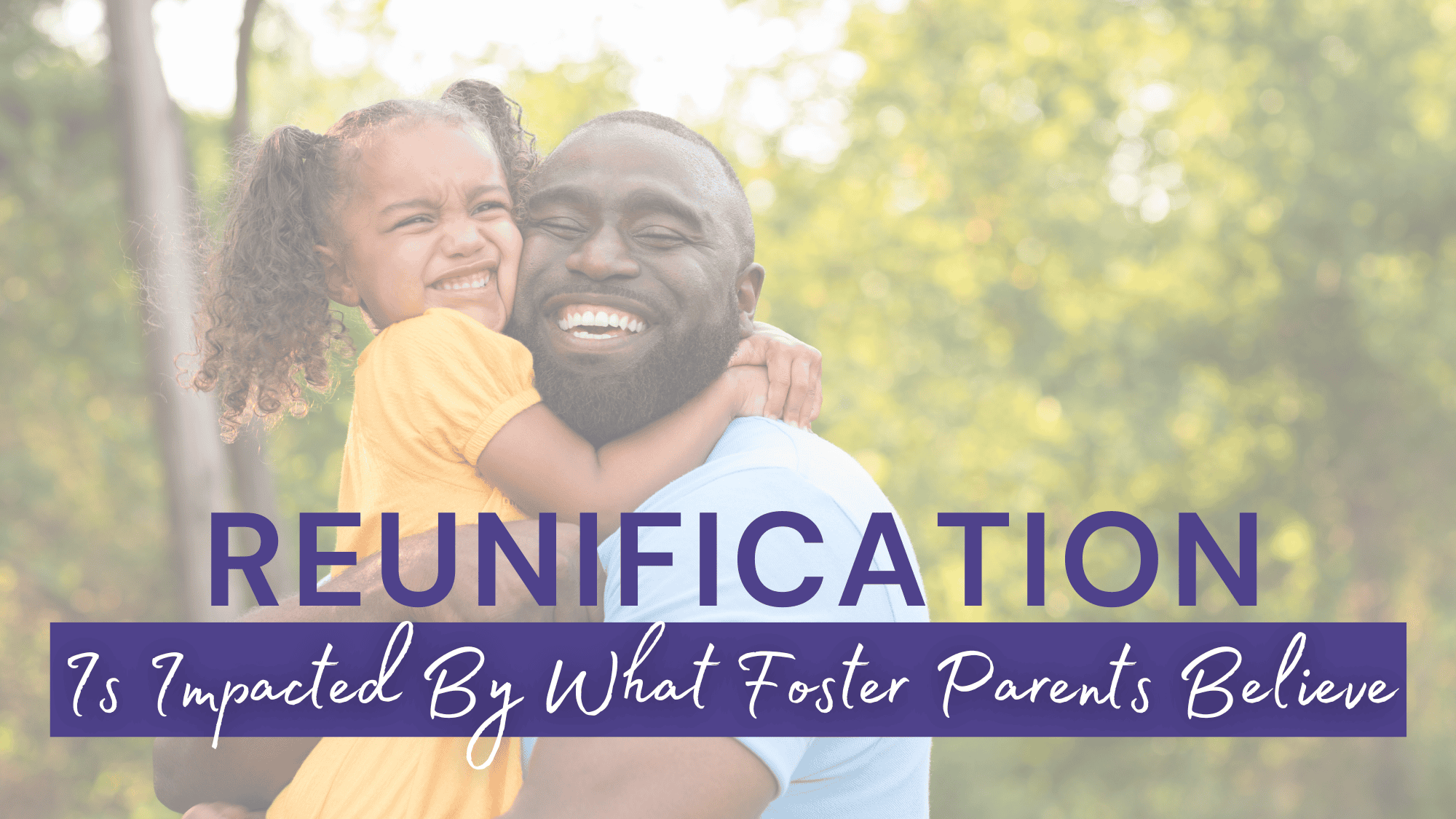I take care of the child, but there’s not much I can do for their parents. I’m not against reunification, but that depends on the family, and there’s nothing I can do about that. I have no control over the way this case plays out.
I’ve thought it all before. If you’re a foster parent, chances are you have, too. In foster parenting, there is so much that is outside of our control that we’re often tempted to think that it’s all out of our control.
We Can Control Our Beliefs About Reunification
You might be as shocked as I was to discover that research shows that there is something very much within our control as foster parents that directly impacts the likelihood of reunification: What we believe. One study found that what foster parents believe about their (foster) children’s (biological)[1] parents directly correlated to the likelihood of reunification[2]. This study wasn’t measuring interventions or supports; it was looking at the internal thoughts, feelings, and beliefs that we hold.

This research is something that I, for one, need to pay attention to. Why? Because, too often, my beliefs are not what they should be. And research shows that maybe yours aren’t either. A study of the attitudes of foster parents found that the majority of foster parents’ attitudes toward biological parents are negative or indifferent, with only 31% of foster parents feeling “sympathetic” towards them. [3] And “sympathetic”—or, to use Biblical language, “compassionate”—is exactly how we should be approaching everyone.
As followers of Jesus, our life stories—and the very basis of our salvation—are built upon our experience as compassion-receivers. Jesus came to earth to live and die for the undeserving and helpless, “he had compassion on [us],” (Matthew 9:36) and loved us at great cost to Himself. The compassion we are willing—or unwilling—to extend to other sinners speaks to the depth of our understanding and gratitude for the compassion we’ve received. As “God’s chosen ones,” we are called to “put on…compassionate hearts” (Colossians 3:12). Unlike the debtor who owes ten thousand bags of gold standing in judgment someone with their debt of one hundred silver coins, we should be quick to show compassion, as He has shown compassion to us (Matthew 18:21-35).
Compassion’s Impact on Reunification
If research and Scripture lead us to understand that holding compassionate beliefs towards our children’s parents is essential, it’s helpful to understand the impact our beliefs can make.

1) Compassion Leads Us To Help Visits Be Successful.
Visits with biological family are the primary intervention for promoting reunification. While we cannot force biological parents to offer nurturing care during visits—or even show up for them—there are certain things that we can do to help these times be successful.
- We can advocate for a time and location that will help the child be at their best.
- We can communicate with parents at drop-off or through a notebook anything that might be helpful to know.
- We can provide snacks and comfort items to help kids feel safe. We can send games, crafts, or activities to help the times be connected.
- We can prepare our kids beforehand and help them process them afterward. We can come alongside our kids’ parents, doing everything within our power to set them up for success in connecting with their kids.
2) Compassion Leads Us To Speak With Encouragement to Our Kids’ Parents.
“I’ve never had someone believe in me the way you do.” My daughter’s mom spoke these words to me and broke my heart. That day, like so many others, I was simply speaking kind and encouraging words to her. I know how much you love your daughter, and I hope she can be with you soon. I am here for you, and I believe you can do this. These words had more to do with my belief in God than they did with my belief in her, so I was able to speak them with faith and confidence. My loving and supportive words encouraged her to believe that she could change in a way she hadn’t believed before and played a part in God bringing healing into her life and family.
3) Compassion Leads Us To Create and Maintain Connections Between Parents and Kids.
Court-ordered visits and mandated contact aside, there are other opportunities we can sometimes create (with the worker’s involvement) to maintain a connection between our kids and their parents.
- We can coordinate phone calls or emails.
- We can set up extra visits for special occasions.
- We can print family photos and talk supportively about biological family within our homes.
- We can pick up treats or small gifts, send along school crafts, and share photos.
- We can invite them to doctor’s appointments and school concerts.
- We can intentionally and creatively build extra opportunities for connection, ensure that our kids feel safe celebrating their family within our home, and remind parents of the children they are fighting for.
4) Compassion Leads Us To Advocate for Our Kids’ Parents.
There are many wonderful social workers and lawyers who work in child welfare, and there are some who have “been around the block” so many times that they approach our kids’ parents with limiting beliefs. These beliefs can impact the services they offer, the support they provide, and the way they talk to parents and kids about their situations. When we come with a hopeful, compassionate perspective of our kids’ families, it can impact how the other players in the system view them, speak to and about them, and serve them.
5) Compassion Leads Us To Pray for Our Kids’ Parents.
Even if there aren’t visits, even when parents aren’t following through with services, even when there is no way that we can practically support reunification, there is always a way we can impact our kids’ families: Prayer. Compassion leads us to be “for” our kids’ parents, even when it appears that reunification could or should not happen. This, again, has more to do with what we believe about God—and the power of prayer—than it does about anything else. Do we believe that God is powerful and loving enough to save and transform anyone—even someone as desperate as our kids’ parents? Even someone as desperate as we were?

Reunification: What Do You Believe?
Our beliefs are central to our faith and our calling as foster parents. What we believe about our (foster) kids’ (biological) parents speaks, more than anything, to what we believe about compassion and what we believe about our God. Evaluating our beliefs as foster parents will help us humbly realign our hearts to the compassion we’ve received and the compassion we are called to show. Here are some questions to help you consider what you believe about your kids’ parents as they hope for reunification:
- Do we believe they can change, grow, heal, and be transformed?
- Do we believe they are precious and valuable, important to their children, and beloved by God?
- Do we believe they have stories, childhoods, and histories that have impacted their struggles and choices?
- Do we believe that God is involved in their stories? Do we believe He is sovereign and powerful, good and wise?
- Do we believe that—lost and defiant in our sin—we were just as needy and undeserving of grace as they are?
[1] For the remainder of the article, I will refer to the children who enter our homes through foster care as “our kids/children” and their biological families as “their parents/families” for the sake of brevity and clarity.
[2] Bourgie C, Ricard N, Pelchat D. 1998
[3] Browne, 2002.















